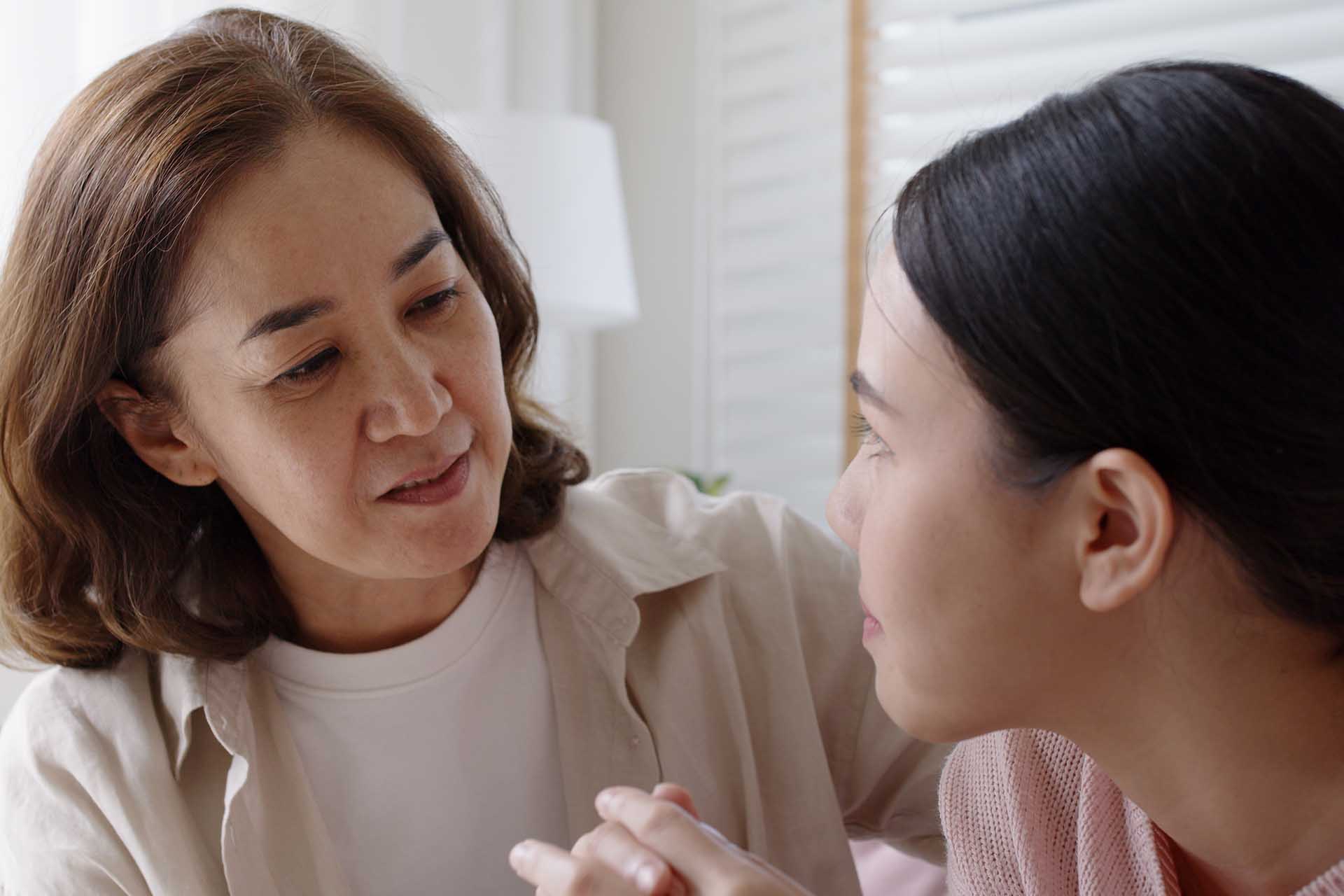Nothing is more heartbreaking than explaining to your child that their illness may not get better and that care is now focused on comfort, not cure. You may not know what to say or how to say it. You may even wonder if you should say anything at all.
But children are intuitive. They know when something serious is happening, and putting off this unimaginably tough conversation can leave them feeling more confused. That’s why open, honest, and age-appropriate communication is one of the greatest gifts you can give as a parent.
Fortunately, you don’t have to do this alone. The Cardinal Kids program at Carolina Caring is here to steady you when your voice shakes and your heart aches. In this blog, we offer insight into how to talk to your child.
Understanding Your Child’s Developmental Stage
How to talk to a child about illness depends on their developmental stage. When you understand how children typically think and feel at different ages, you can choose words and explanations that help them feel safe and supported during pediatric palliative care conversations.
Ages 3 to 5
Children this age see the world in very simple, concrete terms. They might think a life-limiting illness is temporary or something they “caught” like a cold. It’s also not uncommon for kids to think their illness is a punishment for doing something “bad.”
When talking to young kids about hospice, they need to feel loved. Use gentle, affirming language like, “You didn’t cause this,” and “We’re here to take care of you.” Child-friendly explanations of illness are also key.
Ages 6 to 9
Kids in this age range are beginning to understand that death is permanent, but they may still hold onto magical thinking. For example, they may believe that if they “wish hard enough,” the illness will go away.
Elementary-age kids are also naturally curious and may ask a lot of questions during childhood illness discussions. It’s important to meet their questions with child-friendly illness explanations that are honest but not overwhelming.
Ages 10 to 12
Children in this age group have a more logical understanding of illness and death. They know it’s permanent and may ask existential questions as they try to make sense of their experience.
Preteens also have a tendency to hide their feelings to avoid upsetting adults. As a parent, it’s important to create space for honest conversations about pediatric palliative care.
Teenagers
Teenagers grasp the seriousness of illness and death, but this doesn’t necessarily make coping any easier. Many young people wrestle with deep emotions that may show up as withdrawal, irritability, or mood swings.
When thinking about how to talk to a child about illness, especially a teen, try to meet them where they are. If they aren’t ready to open up to you, they might feel more comfortable talking with a counselor or attending a peer support group.
If you’re unsure of how to initiate childhood illness discussions, remember that you don’t have to do it alone. Professionals who specialize in palliative care for young adults are trained to support families through these difficult talks. They can help you find the right words and offer compassionate guidance when you need it most.
When to Have These Conversations
While there’s rarely a “perfect” time to talk to your child about pediatric palliative care, waiting too long can cause confusion and fear.
Your child may be ready for an age-appropriate discussion about illness if they are:
- Asking direct or repetitive questions about illness, treatment, or death
- Showing emotional changes such as withdrawal, irritability, or anxiety
- Expressing fears or worries through play or stories
- Seeking physical touch and comfort more often
- Wanting to spend more time with family or loved ones
If you’re unsure if now is the right time, a social worker or counselor can offer guidance based on your child’s age and emotional capacity.
Timing and Disease Progression
Talking to kids about hospice often becomes more relevant as their illness progresses. Changes in condition or treatment can prompt new questions, and these moments are opportunities to offer honest, gentle explanations.
You may begin talking to your child about pediatric palliative care when:
- There’s a change in diagnosis
- They start, stop, or switch treatments
- New symptoms arise or existing symptoms worsen
- The focus moves from curative measures to providing comfort
- Hospital stays become more frequent or longer
It’s also important to remember that conversations about pediatric palliative care are part of an ongoing dialogue. As circumstances change, your child will likely return to the topic with new questions or concerns.
Creating a Safe Space for Difficult Conversations
Talking to kids about hospice is never easy. There’s no perfect script, and you don’t have to get it exactly right for the conversation to be meaningful. What matters most is showing up with honesty, love, and a willingness to listen.
Step 1: Choose the Right Time and Place
Pick a private, familiar environment where your child feels at ease. Choose a time of day when neither of you is rushed or tired, and be sure to turn off phones, TVs, and other distractions.
Step 2: Prepare Yourself Emotionally
Before the childhood illness discussion, check in with your own feelings. This is a heavy topic, and it may help to take some deep breaths, go for a short walk, or jot down a few key points you want to cover.
Step 3: Bring in Support
If possible, both parents or primary caregivers should be present for the conversation. In some cases, involving a social worker or counselor can be beneficial, too.
Step 4: Offer Comfort and Reassurance
Have familiar items close by, like a favorite stuffed animal or a blanket. Let your child know it’s perfectly okay to ask questions, share their feelings, or simply sit quietly.
Step 5: Plan for Ongoing Conversations
Share only as much information as your child can process right now. Encourage them to come back with more questions or thoughts.
Age-Appropriate Ways to Explain Illness and Care
Children process information differently at each stage of development. Having age-appropriate discussions about illness and death can help create emotional safety.
For Younger Children (Ages 3 to 7)
At this stage, children think in very literal terms. Keep language simple and concrete.
“Your body is very sick. But there are special helpers who will make sure you don’t hurt.”
- Emphasize that doctors and nurses are working to help them feel comfortable.
- Avoid using idiomatic phrases like “went to sleep” to describe death.
- Use storybooks, drawings, or toys to explain what’s happening.
- Offer consistent reassurance that they are loved and that they aren’t to blame.
For School-Age Children (Ages 8 to 12)
Children at this age are more curious and capable of understanding how the body works. They may ask detailed questions or want to know what’s next.
“The treatments aren’t working anymore, so now we’re focusing on keeping you comfortable and doing things that help you feel good.”
- Use accurate yet gentle medical terms during child-friendly explanations of illness.
- Introduce the care team and explain their roles (e.g., “The social worker helps us talk through feelings.”).
- Talk about palliative care as care that focuses on comfort rather than curing.
- Make space for their emotions, even if they don’t express them right away.
For Teenagers (Ages 13+)
Teens can grasp complex ideas and may want to be more actively involved in decisions. They also need space to process their emotions independently.
“We want to be honest with you and include you in these conversations. You deserve to know what’s happening and to help make choices about your care.”
- Share information openly, using clear terms while remaining sensitive.
- Involve them in discussions about goals of care.
- Begin conversations about advance care planning, if appropriate.
- Respect their growing independence while offering emotional support.
These conversations are difficult, and it’s okay to feel overwhelmed. Fortunately, you don’t have to do this alone. Pediatric palliative and hospice care specialists can help you talk with your child in a supportive, age-appropriate way.
Involving Children in Care Decisions
Involving children in small, age-appropriate care choices can offer a sense of agency during a time when so much feels out of their control.
For Younger Children (Ages 3 to 7)
Younger children feel most secure when given binary choices (i.e., “this or that”).
Ways to offer choice:
- “Do you want to wear your red socks or the green ones?”
- “Would you like to watch a show or read a book while the nurse visits?”
- “Should your bear or doll come with us to the doctor?”
For School-Age Children (Ages 8 to 12)
Kids this age do well when they can make decisions about their daily routine. Just be sure to keep choices simple and manageable.
Ways to offer choice:
- “Do you want to do physical therapy in the morning or afternoon?”
- “Would you rather have a visitor today or keep it quiet?”
- Let them rearrange their room or choose decorations.
- Ask which members of the care team they feel most comfortable talking to.
For Teenagers (Ages 13+)
Teens value independence and should be included in meaningful decisions whenever possible.
Ways to offer choice:
- Invite them to join conversations about symptom management, comfort goals, and treatment preferences.
- Ask questions like, “What’s most important to you right now?” and “What helps you feel more like yourself?”
- Let them decide how to spend their time and who they spend that time with.
- Give them the tools to document their wishes and preferences.
All children differ in how much control they want over their care. Some feel empowered by being involved, while others prefer to let parents take the lead. Regardless, you should reassure your child that, as a parent, you will make decisions with their best interests in mind.
Introducing the Concept of Advance Care Planning
Advanced care planning is about ensuring a child’s voice is honored throughout their care journey.
For younger kids, this can be as simple as choosing what music to listen to, what comfort items to bring to appointments, or who they’d like nearby when they don’t feel well. Some children may also enjoy legacy-building activities, like creating a memory box with loved ones.
Older children and teens may be ready for deeper conversations. They might want to explore their feelings about illness, death, and faith or spirituality; what legacy they want to leave behind; and how they want to be remembered. If your teen is open to it, you may offer age-appropriate advance directive tools to help them document their care preferences.
Common Reactions and How to Handle Them
Children confronting serious illness often feel a mix of intense emotions. These feelings can sometimes lead to challenging behaviors, which can leave caregivers unsure of how best to respond.
- Mood swings: Children may experience sudden changes in emotion, pushing you away one minute and seeking comfort the next. Validate their feelings with language such as, “I see that you’re feeling really angry right now.”
- Regression in behavior: Younger children might start thumb-sucking or bedwetting again. Respond to these signs of stress with patience and reassurance.
- Repeating questions: Kids may ask the same difficult questions multiple times. Provide consistent, honest answers using age-appropriate language.
- Withdrawal or clinginess: Some children may pull away, while others may become more dependent. Respect their needs by offering space if they withdraw, and extra comfort if they become clingy.
- Protecting parents: Older children or teens might hide their feelings to avoid worrying you. Assure them you can handle their emotions.
- Feelings of guilt or shame: Young children may believe their illness is a punishment for doing something “bad.” Offer gentle, clear reassurance that their illness isn’t anyone’s fault.
If your child becomes persistently withdrawn, anxious, aggressive, or exhibits significant changes in behavior or mood, it may be time to seek extra help. Pediatric palliative care teams typically include counselors, child life specialists, and social workers who can offer age-appropriate support tailored to your child’s emotional needs.
Frequently Asked Questions
How do I talk to my kid about hospice care?
When having pediatric palliative care conversations, it’s important to use honest, gentle, and age-appropriate language. Using child-friendly illness explanations can help them understand what’s happening without overwhelming them.
What if my child doesn’t want to talk about their illness?
Talking to kids about hospice means balancing honesty with sensitivity. Give them room to process in their own time, and reassure them that they can always come to you.
What if my child’s questions are too difficult for me to handle?
Providing child-friendly illness explanations doesn’t mean having all the answers; it means being honest and supportive. You might say, “That’s a really good question. I’m not sure, but we can find out together.” From there, reach out to professionals who can help guide these conversations in an age-appropriate way.
What role should my child play in planning their own care?
The role your child plays in planning their care depends on their age, comfort level, and individual situation. For a younger child, you might offer simple choices, like choosing a favorite stuffed animal to bring to appointments. Comparatively, a teen might express preferences about treatments, visitors, or who should be part of their care team.
Pediatric Palliative Care in North Carolina
Figuring out how to talk to your child about illness is never easy. Many parents worry that being honest will take away hope, but pediatric palliative care conversations are really about building trust. These open, age-appropriate illness discussions create space for your child to ask questions, express emotions, and feel less alone.
You’re not alone either. Carolina Caring’s Cardinal Kids program offers specialized pediatric palliative and hospice care designed to meet the physical, emotional, and spiritual needs of children with serious illnesses while also supporting parents and caregivers. From those rocky weeks after your child’s diagnosis to those heartbreaking moments in the wake of loss, our compassionate team will walk alongside you and your child.
Contact us to learn how our dedicated team can support your family.



